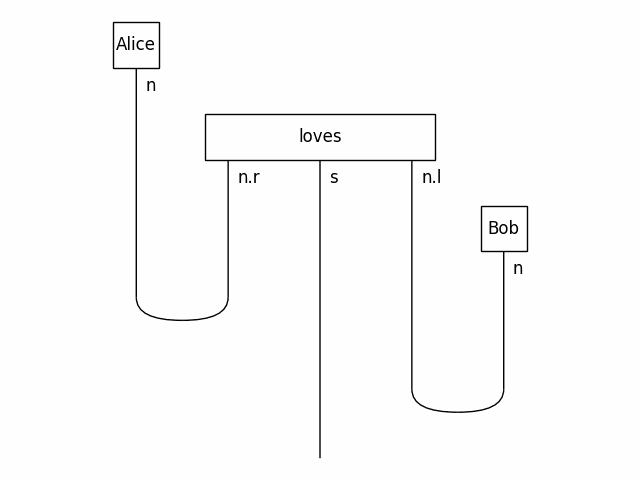DisCoPy is a tool box for computing with monoidal categories.
Diagrams are the core data structure of DisCoPy, they are generated by the following grammar:
diagram ::= Box(name, dom=type, cod=type)
| diagram @ diagram
| diagram >> diagram
| Id(type)
type ::= Ty(name) | type.l | type.r | type @ type | Ty()String diagrams (also known as tensor networks or Penrose notation) are a graphical calculus for computing with monoidal categories. For example, if we take ingredients as types and cooking steps as boxes then a diagram is a recipe:
from discopy import Ty, Box, Id, Swap
egg, white, yolk = Ty('egg'), Ty('white'), Ty('yolk')
crack = Box('crack', egg, white @ yolk)
merge = lambda x: Box('merge', x @ x, x)
crack_two_eggs = crack @ crack\
>> Id(white) @ Swap(yolk, white) @ Id(yolk)\
>> merge(white) @ merge(yolk)
crack_two_eggs.draw(path='docs/_static/imgs/crack-eggs.png')Wires can be bended using two special kinds of boxes: cups and caps, which satisfy the snake equations, also called triangle identities.
from discopy import Cup, Cap
x = Ty('x')
left_snake = Id(x) @ Cap(x.r, x) >> Cup(x, x.r) @ Id(x)
right_snake = Cap(x, x.l) @ Id(x) >> Id(x) @ Cup(x.l, x)
assert left_snake.normal_form() == Id(x) == right_snake.normal_form()In particular, DisCoPy can draw the grammatical structure of natural language sentences encoded as reductions in a pregroup grammar (see Lambek, From Word To Sentence (2008) for an introduction).
from discopy import grammar, Word
s, n = Ty('s'), Ty('n')
Alice, Bob = Word('Alice', n), Word('Bob', n)
loves = Word('loves', n.r @ s @ n.l)
sentence = Alice @ loves @ Bob >> Cup(n, n.r) @ Id(s) @ Cup(n.l, n)
grammar.draw(sentence,
path='docs/_static/imgs/alice-loves-bob.png',
fontsize=20, fontsize_types=12)Monoidal functors compute the meaning of a diagram, given an interpretation for each wire and for each box. In particular, tensor functors evaluate a diagram as a tensor network using numpy. Applied to pregroup diagrams, DisCoPy implements the distributional compositional (DisCo) models of Clark, Coecke, Sadrzadeh (2008).
from discopy import TensorFunctor
F = TensorFunctor(
ob={s: 1, n: 2},
ar={Alice: [1, 0], loves: [[0, 1], [1, 0]], Bob: [0, 1]})
assert F(sentence) == 1Free functors (i.e. from diagrams to diagrams) can fill each box with a complex diagram.
The result can then be simplified using diagram.normalize() to remove the snakes.
from discopy import Functor
def wiring(word):
if word.cod == n: # word is a noun
return word
if word.cod == n.r @ s @ n.l: # word is a transitive verb
return Cap(n.r, n) @ Cap(n, n.l)\
>> Id(n.r) @ Box(word.name, n @ n, s) @ Id(n.l)
W = Functor(ob={s: s, n: n}, ar=wiring)
rewrite_steps = W(sentence).normalize()
sentence.to_gif(*rewrite_steps, path='autonomisation.gif', timestep=1000)You can load "Alice in Wonderland" in DisCoCat form with a single command:
from discopy import utils
url = "https://qnlp.cambridgequantum.com/corpora/alice/discocat.zip"
diagrams = utils.load_corpus(url)Find more DisCoCat resources at https://qnlp.cambridgequantum.com/downloads.html.
pip install discopyContributions are welcome, please drop one of us an email or open an issue.
If you want the bleeding edge, you can install DisCoPy locally:
git clone https://github.com/oxford-quantum-group/discopy.git
cd discopy
pip install .You should check you haven't broken anything by running the test suite:
pip install ".[test]" .
pip install pytest coverage pycodestyle
coverage run -m pytest --doctest-modules --pycodestyle
coverage report -m discopy/*.py discopy/*/*.pyThe documentation is built automatically from the source code using sphinx. If you need to build it locally, just run:
(cd docs && (make clean; make html))The tool paper is now available on arXiv:2005.02975, it was presented at ACT2020.
The documentation is hosted at readthedocs.io, you can also checkout the notebooks for a demo!





